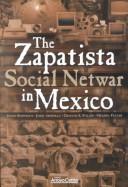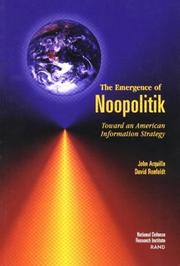| Listing 1 - 10 of 14 | << page >> |
Sort by
|

ISBN: 1282451480 9786612451485 0833043323 0585246483 0833026569 9780585246482 9780833043320 9780833026569 9781282451483 6612451483 Year: 1998 Publisher: Santa Monica, CA Rand
Abstract | Keywords | Export | Availability | Bookmark
 Loading...
Loading...Choose an application
- Reference Manager
- EndNote
- RefWorks (Direct export to RefWorks)
The information revolution is leading to the rise of network forms of organization in which small, previously isolated groups can communicate, link up, and conduct coordinated joint actions as never before. This in turn is leading to a new mode of conflict--netwar--in which the protagonists depend on using network forms of organization, doctrine, strategy, and technology. Many actors across the spectrum of conflict--from terrorists, guerrillas, and criminals who pose security threats, to social activists who may not--are developing netwar designs and capabilities. The Zapatista movement in Mex
National security --- Internet --- Information networks --- Public opinion --- Social aspects --- Ejército Zapatista de Liberación Nacional (Mexico) --- Public opinion. --- Chiapas (Mexico) --- Mexico --- History --- Propaganda. --- Military policy. --- Automated information networks --- Networks, Information --- DARPA Internet --- Internet (Computer network) --- Armée zapatiste de libération nationale (Mexico) --- Zapatista National Liberation Army (Mexico) --- EZLN --- Zapatista Army of National Liberation (Mexico) --- Zapatistas --- Meksiko --- Stany Zjednoczone Meksyku --- Meksyk --- Estados Unidos Mexicanos --- Meḳsiḳe --- Mexique (Country) --- Messico --- Méjico --- República Mexicana --- United States of Mexico --- United Mexican States --- Anáhuac --- メキシコ --- Mekishiko --- מקסיקו --- Information services --- Information storage and retrieval systems --- Wide area networks (Computer networks) --- World Wide Web --- Maxico --- Estado de Chiapas (Mexico) --- Ejercito Zapatista de Liberacion Nacional (Mexico)
Book
Year: 1983 Publisher: Santa Monica, CA : RAND Corporation,
Abstract | Keywords | Export | Availability | Bookmark
 Loading...
Loading...Choose an application
- Reference Manager
- EndNote
- RefWorks (Direct export to RefWorks)
This study examines some operational military issues involving the Caribbean Basin, and it reflects the broader concern that answers to operational military questions should depend heavily on answers to more fundamental questions about why and how the United States should be interested in this complex, unstable region. Based on an examination of current trends as well as historical experience since promulgation of the Monroe Doctrine, the study advances a conceptual framework that identifies underlying geostrategic principles for guiding U.S. policy in the Basin. The study then proposes specific measures for developing an integrated political, economic, and military strategy that would advance U.S. interests and meet the interests of Basin neighbors.
Caribbean Area --- United States --- Foreign relations --- Strategic aspects.
Book
Year: 1986 Publisher: Santa Monica, CA : RAND Corporation,
Abstract | Keywords | Export | Availability | Bookmark
 Loading...
Loading...Choose an application
- Reference Manager
- EndNote
- RefWorks (Direct export to RefWorks)
"This report presents the main findings of [Castro, Cuba, and the World], R-3420, which provides a new profile of Fidel Castro's mindset and behavior as a political actor, and assesses Cuba's current domestic and international situations, in order to analyze Castro's future foreign policy options."--Rand abstracts
Heads of state --- Castro, Fidel, --- Psychology. --- Cuba --- Cuba --- Politics and government --- Foreign relations
Book
Year: 1986 Publisher: Santa Monica, CA : RAND Corporation,
Abstract | Keywords | Export | Availability | Bookmark
 Loading...
Loading...Choose an application
- Reference Manager
- EndNote
- RefWorks (Direct export to RefWorks)
This report combines an analysis of Fidel Castro's mindset and patterns of behavior as a political actor with assessments of Cuba's current domestic and international situations, in order to assess Castro's foreign policy options through the late 1980s. The findings suggest that, in spite of signs of tactical moderation, Castro continues to adhere to the same maximalist ambitions and behavioral patterns that have characterized his rule for more than 25 years. He will work to ensure the survival of his Sandinista allies in Nicaragua and, if given Soviet backing, may actively seek to defeat the United States in southern Africa.
Heads of state --- Castro, Fidel, --- Psychology. --- Cuba --- Politics and government --- Foreign relations
Book
Year: 1994 Publisher: Santa Monica, CA : RAND Corporation,
Abstract | Keywords | Export | Availability | Bookmark
 Loading...
Loading...Choose an application
- Reference Manager
- EndNote
- RefWorks (Direct export to RefWorks)
Political leadership --- Leadership. --- International relations --- Psychological aspects.
Book
Year: 1992 Publisher: Santa Monica, CA : RAND Corporation,
Abstract | Keywords | Export | Availability | Bookmark
 Loading...
Loading...Choose an application
- Reference Manager
- EndNote
- RefWorks (Direct export to RefWorks)
The Castro regime remains in the throes of its worst crisis. The failure of the right-wing Soviet coup and the subsequent dissolution of the USSR at the end of 1991 have left Cuba adrift in the world and its economy in shambles. Nevertheless, the regime is likely to survive over the short- and possibly mid-term. It possesses a strong, repressive state, while facing a weak "civil society." However, if the economic decline is not arrested, uncontrolled, potentially violent change could be detonated by disaffected elements within the regime or by an increasingly desperate populace. U.S. policy needs to discriminate carefully between a Cuba under Castro and a Cuba after Castro. It also needs to be flexible. Neither heightening U.S. pressures nor lifting the U.S. embargo are advisable at present, and both could lock U.S. policy into irreversible modes. Persisting with the established policy of containment is preferable for now, but it should be modified with a new information and communication policy to promote civil society and prepare for a Cuba after Castro.
Cuba --- United States --- Politics and government --- Economic conditions --- Foreign relations
Book
Year: 1989 Publisher: Santa Monica, CA : RAND Corporation,
Abstract | Keywords | Export | Availability | Bookmark
 Loading...
Loading...Choose an application
- Reference Manager
- EndNote
- RefWorks (Direct export to RefWorks)
This study, completed in September 1988, is based on interviews conducted in 1985 and 1986 with three Hondurans: Gustavo Alvarez Martinez, Cesar A. Batres, and Victor Meza. It reports on the way U.S. involvement in Central America is apparently being perceived in Honduras and how this may affect local political and military behavior, including security cooperation with the United States. The interviews substantiate the enduring and pervasive importance of nationalism as the prism through which local elites look at security issues. The interviews acknowledge the benefits Honduras obtains from U.S. involvement in the region. They also illuminate a growing sense of the costs and risks a small country faces in an alliance with the United States against an external threat that the small country faces to a lesser degree and that the United States seems unable to handle directly in an efficient way. Finally, the interviews warn about a slowly growing, unexpected potential for anti-Americanism in a country that has never been anti-American. The significance of the interviews seems to extend beyond Honduras, reflecting broader trends in strategic thinking in Latin America, suggesting that Latin American strategic thinking about the United States is entering a new phase.
Nationalism --- History --- Central America --- United States --- Honduras --- Relations --- Politics and government --- Military policy.
Book
Year: 1989 Publisher: Santa Monica, CA : RAND Corporation,
Abstract | Keywords | Export | Availability | Bookmark
 Loading...
Loading...Choose an application
- Reference Manager
- EndNote
- RefWorks (Direct export to RefWorks)
This report presents the results of a 1987 RAND conference on the Nicaraguan Resistance and U.S. Policy Implications. The conference, part of RAND's Western Hemisphere Forum, included presentations on (1) background of the resistance and U.S. support for it, (2) the strategic poverty of the Reagan Administration's vision regarding Nicaragua, (3) the Nicaraguan resistance in transition, (4) Sandinista strategy, and (5) diplomatic-political options in Nicaragua. The conference participants had varied backgrounds in official diplomatic and military capacities and in political activism, policy analysis, or policy-oriented research.
Counterrevolutionaries --- Counterrevolutions --- United States --- Nicaragua --- Foreign relations --- Politics and government
Book
Year: 1999 Publisher: Washington, DC : U.S. Institute of Peace,
Abstract | Keywords | Export | Availability | Bookmark
 Loading...
Loading...Choose an application
- Reference Manager
- EndNote
- RefWorks (Direct export to RefWorks)
Diplomacy --- Communication in international relations. --- Information technology --- Technological innovations. --- Political aspects.

ISBN: 1282451111 9786612451119 0833048279 0585243484 0833026984 9780585243481 9780833048271 6612451114 9780833026989 Year: 1999 Publisher: Santa Monica, CA : Rand,
Abstract | Keywords | Export | Availability | Bookmark
 Loading...
Loading...Choose an application
- Reference Manager
- EndNote
- RefWorks (Direct export to RefWorks)
Strategy, at its best, knits together ends and means, no matter how various and disparate, into a cohesive pattern. In the case of a U.S. information strategy, this requires balancing the need to guard and secure access to many informational capabilities and resources, with the opportunity to achieve national aims by fostering as much openness as practicable. The authors' term to represent such strategic balancing is guarded openness. They go on to describe noopolitik (nu-oh-poh-li-teek)--an emerging form of statecraft that emphasizes the importance of sharing ideas and values globally, princi
Information policy -- United States. --- Information society. --- International relations. --- Telematics -- Social aspects. --- United States -- Foreign relations -- 1989-. --- International relations --- Information society --- Telematics --- Information policy --- Law, Politics & Government --- International Relations --- Social aspects --- Social aspects. --- United States --- Foreign relations --- CMC systems --- Computer-mediated communication --- Coexistence --- Foreign affairs --- Foreign policy --- Global governance --- Interdependence of nations --- International affairs --- Peaceful coexistence --- World order --- Telecommunication --- Cyberspace --- National security --- Sovereignty --- World politics --- Sociology --- Information superhighway
| Listing 1 - 10 of 14 | << page >> |
Sort by
|

 Search
Search Feedback
Feedback About UniCat
About UniCat  Help
Help News
News